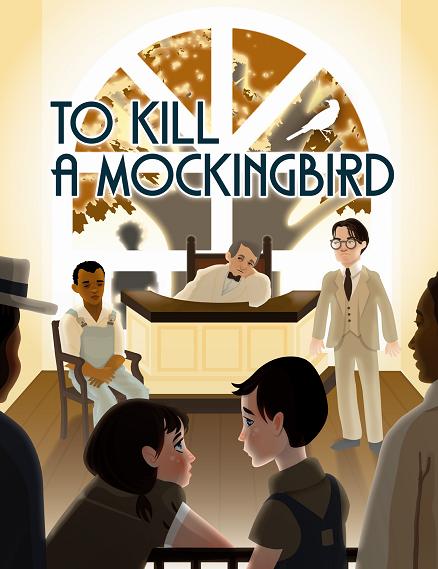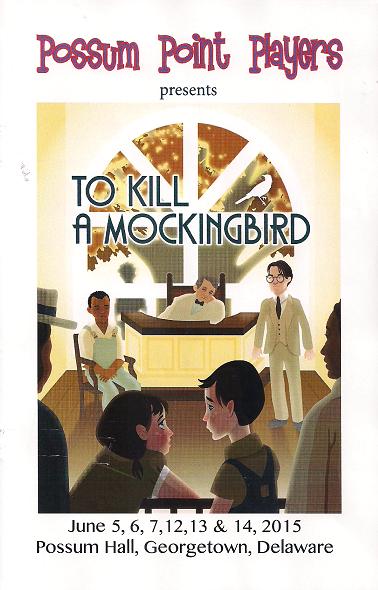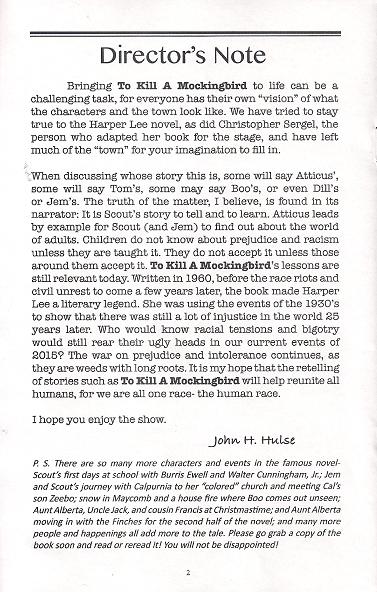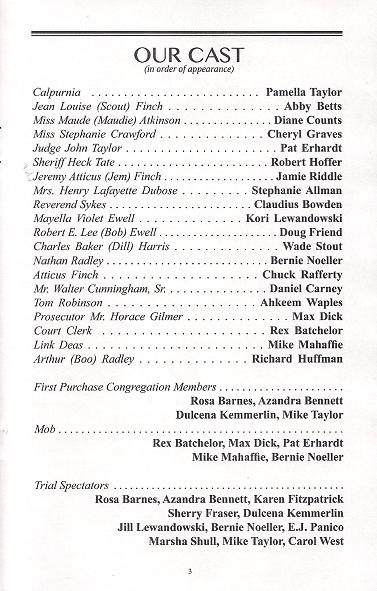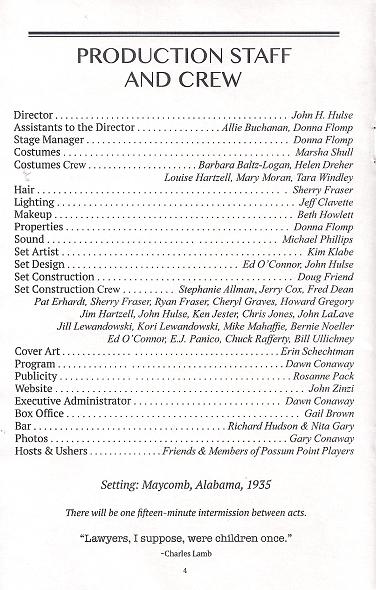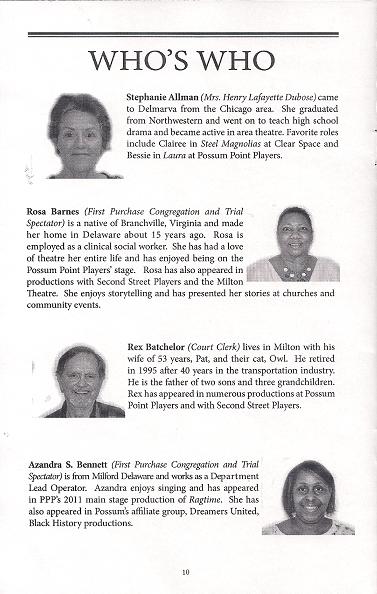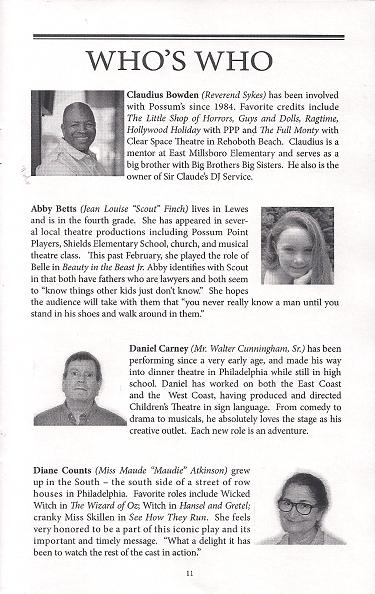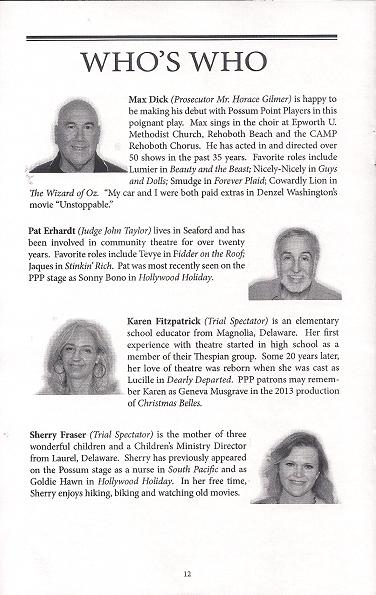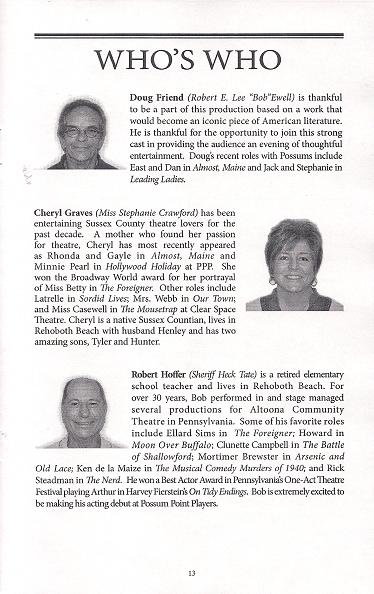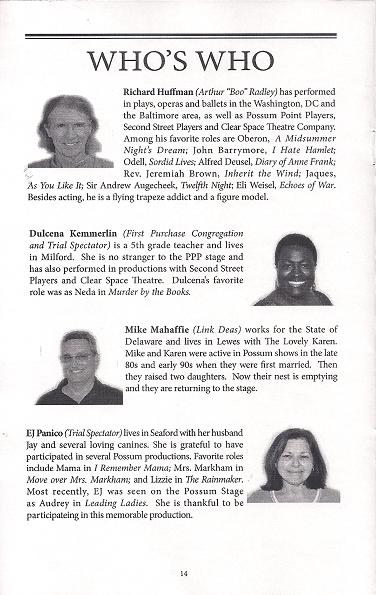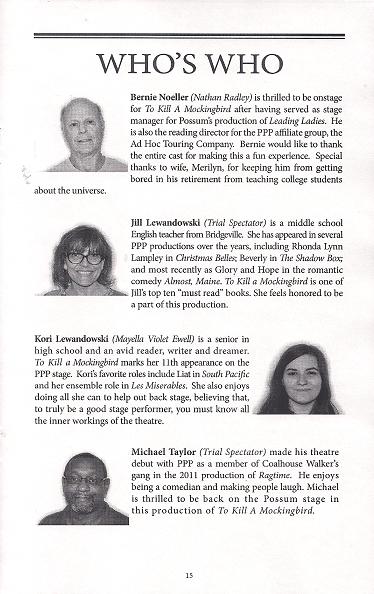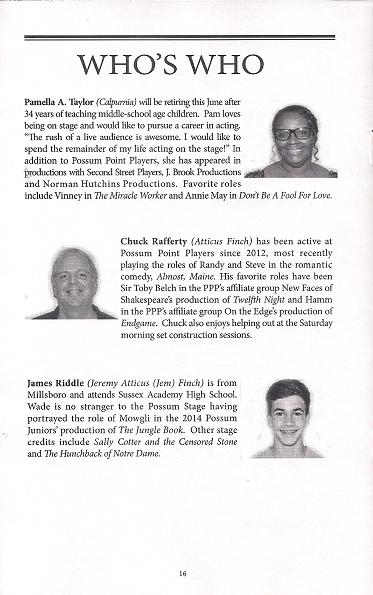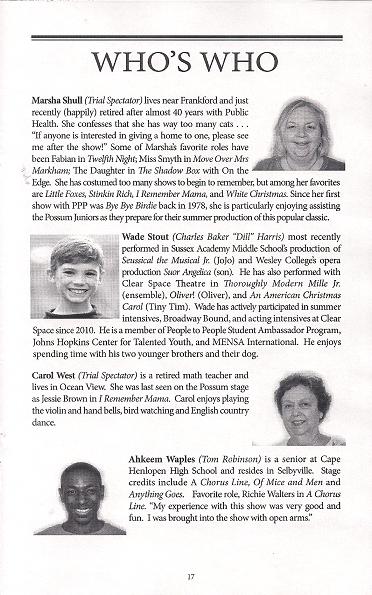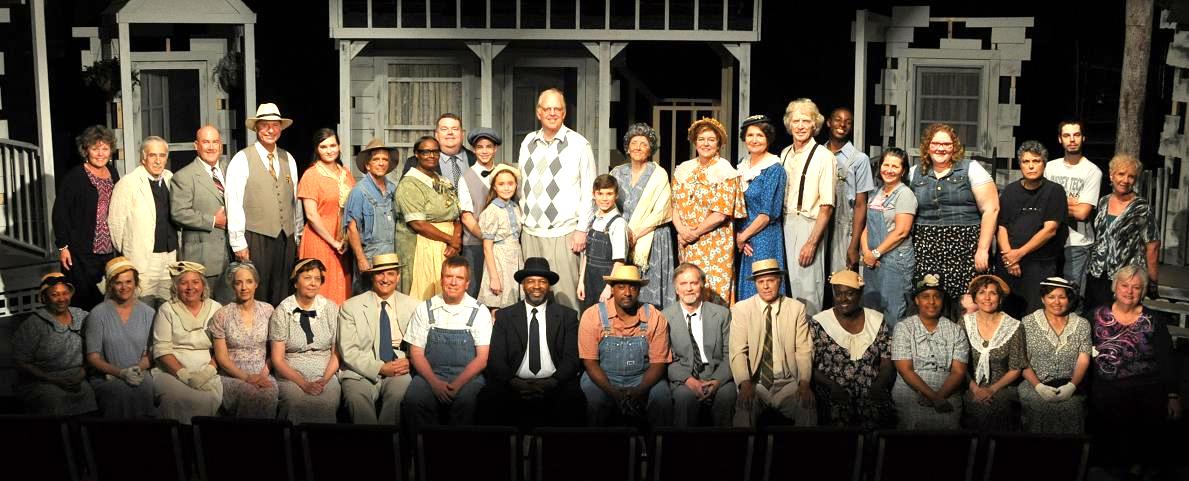On Our Stages...
Get to Know Us...
441 Old Laurel Road - Georgetown, Delaware / Mailing Address: P O Box 96, Georgetown DE 19947 / Office Phone: 302-856-3460
Dawn Conaway, PPP Executive Administrator / TICKETLINE: 302-856-4560 / EMAIL: mail@possumpointplayers.org
PPP presents an American classic
To Kill a
Mockingbird
based on the novel by Harper Lee
adapted for the stage by Christopher Sergel
directed by John H. Hulse
Fridays JUNE 5 & JUNE 12 at 7:30p
Saturdays JUNE 6 & JUNE 13 at 7:30p
Sundays JUNE 7 & JUNE 14 at 2:00p
Possum Hall / 441 Old Laurel Road / Georgetown, DE
Tickets: Adult Reserved: $18.00 - Senior/Student Reserved: $17.00
Jean Louise (Scout) Finch... Abby Betts
Miss Stephanie Crawford... Cheryl Graves
Sheriff Heck Tate... Robert Hoffer
Mrs. Henry Lafayette Dubose... Stephanie Allman
Mayella Violet Ewell... Kori Lewandowski
Charles Baker (Dill) Harris... Wade Stout
Atticus Finch...Chuck Rafferty
Tom Robinson...Ahkeem Waples
Court Clerk... Rex Batchelor
Rex Batchelor
Arthur (Boo) Radley...Richard Huffman
Calpurnia... Pamella A. Taylor
Miss Maude (Maudie) Atkinson... Diane Counts
Judge John Taylor... Pat Erhardt
Jeremy Atticus (Jem) Finch... James Riddle
Reverend Sykes... Claudius Bowden
Robert E. Lee (Bob) Ewell... Doug Friend
Nathan Radley... Bernie Noeller
Mr. Walter Cunningham, Sr.... Dan Carney
Prosecutor Mr. Horace Gilmer... Max Dick
Link Deas... Mike Mahaffie
First Purchase Congregation Members
Rosa Barnes • Azandra S. Bennett • Dulcena Kemmerlin • Michael Taylor
Mob
Rex Batchelor • Max Dick • Pat Erhardt • Mike Mahaffie • Bernie Noeller
Trial Spectators
Rosa Barnes • Azandra S. Bennett • Karen Fitzpatrick • Sherry Fraser
Dulcena Kemmerlin • Jill Lewandowski • E.J. Panico
Marsha Shull • Michael Taylor • Carol West
THE CAST
(In Order of Appearance)
THE PRODUCTION TEAM
Director... John H. Hulse
Assistants to the Director... Allie Buchanan, Donna Flomp
Stage Manager... Donna Flomp
Costumes... Marsha Shull
Hair... Sherry Fraser
Lighting... Jeff Clavette
Makeup... Beth Howlett
Properties... Donna Flomp
Set Design... Ed O’Connor, John H. Hulse
Set Artist... Kim Klabe
Set Construction... Doug Friend
Sound... Michael Phillips
Publicity... Rosanne Pack
Photos... Gary Conaway
Cover Art... Erin Schectman
Bar... Richard Hudson, Nita Gary
PPP Executive Administrator... Dawn P. Conaway
Box Office... Gail Brown
THE STORY...
Scout, a young girl in a quiet southern town, is about to experience the dramatic events that will affect the rest of her life. She and her brother, Jem, are being raised by their widowed father, Atticus, and by a strongminded housekeeper, Calpurnia. Wide-eyed Scout is fascinated with the sensitively revealed people of her small town, but, from the start, there's a rumble of thunder just under the calm surface of the life here.
The black people of the community have a special feeling about Scout's father and she doesn't know why. A few of her white friends are inexplicably hostile and Scout doesn't understand this either. Unpleasant things are shouted and the bewildered girl turns to her father. Atticus, a layer, explains that he's defending a young Negro wrongfully accused of a grave crime. Since this is causing such an upset, Scout wants to know why he's doing it. "Because if I didn't," her father replies, "I couldn't hold my head up." When she asks why take on such a hopeless fight the time of the play is 1935 he tells her, "Simply because we were licked a hundred years before we started is no reason not to try."
He goes on to prepare Scout for the trouble to come. "We're fighting our friends. But remember this, no matter how bitter things get, they're still our friends." Things do get bitter to the point where Atticus props himself in a chair against the cell door of the man he's defending and confronts an angry mob. Horrified Scout projects herself into this confrontation, and her inconvenient presence helps bring back a little sanity.
Atticus fights his legal battle with a result that is part defeat, part triumph. As Atticus comes out of the courthouse, the deeply moved town minister tells Scout, "Stand up. Your father's passing!"
AN AMERICAN CLASSIC...
To Kill a Mockingbird was first published in 1960. The novel by Harper Lee was immediately successful, winning the Pulitzer Prize, and has since become a classic of modern American literature. The plot and characters are loosely based on the author's observations of her family and neighbors, as well as on an event that occurred near her hometown in 1936, when she was 10 years old.
Christopher Sergel's stage adaptation of the novel has become the definitive treatment of the original work and is widely performed all over the world.
The story is renowned for its warmth and humor, despite dealing with the serious issues of rape and racial inequality. The narrator's father, Atticus Finch, has served as a moral hero for many readers and as a model of integrity for lawyers. One critic explains its impact by writing, "In the twentieth century, To Kill a Mockingbird was probably the most widely read book dealing with race in America, and its protagonist, Atticus Finch, the most enduring fictional image of racial heroism." Sergel's adaptation preserves each of the novel's endearing and powerful elements and the result is riveting stage drama.
The strong themes and the language of the era make TO KILL A MOCKINGBIRD appropriate for mature audiences. Parents are advised to review the story as written and use precaution in allowing children younger than teenagers to attend.
